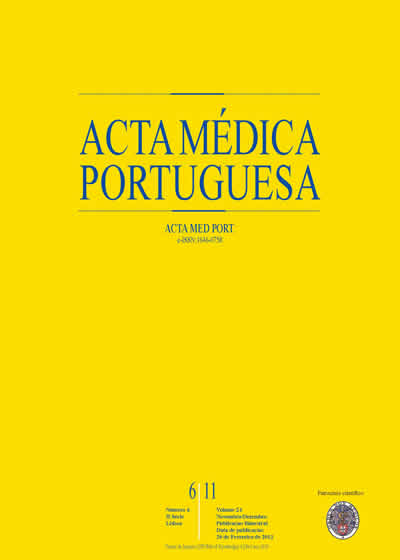Chronic medication in the perioperative period: usage profile and risk management.
DOI:
https://doi.org/10.20344/amp.1428Abstract
Currently, an increasing number of surgeries are performed in an older and higher risk population, due to the inherent comorbidity and polypharmacy associated with this population group. The characterization of drug usage profiles in the perioperative period is critically needed to understand the nature of adverse events and to achieve a more efficient iatrogenic risk management.During 1 year, all adult patients (>18 years) consecutively admitted for elective surgery at "Cova da Beira" Hospital Center (CHCB) were included in the study. The demographic characteristics, and data on chronic medication use and their administration to the patients in study, in the perioperative period were collected.A total of 404 patients were evaluated. The majority of patients (69.9%) were taking chronic medication (mean 2.5 by admission), mainly "anti-hypertensive" (58.5%) and "psychotropics" (33.5%). 973 drugs were registered as chronic medication. 79.1% of these drugs were withdrawn before the surgery, 10.7% were continued and 7.7% were replaced for another drug of the same therapeutic group.The majority of patients, admitted for general surgery, take chronic medications, which were withdrawn before surgery, in the majority of cases. Additional assessment of perioperative complications, as result of drug withdrawal, is urgently needed for surgical therapeutic management.Downloads
Downloads
Published
How to Cite
Issue
Section
License
All the articles published in the AMP are open access and comply with the requirements of funding agencies or academic institutions. The AMP is governed by the terms of the Creative Commons ‘Attribution – Non-Commercial Use - (CC-BY-NC)’ license, regarding the use by third parties.
It is the author’s responsibility to obtain approval for the reproduction of figures, tables, etc. from other publications.
Upon acceptance of an article for publication, the authors will be asked to complete the ICMJE “Copyright Liability and Copyright Sharing Statement “(http://www.actamedicaportuguesa.com/info/AMP-NormasPublicacao.pdf) and the “Declaration of Potential Conflicts of Interest” (http:// www.icmje.org/conflicts-of-interest). An e-mail will be sent to the corresponding author to acknowledge receipt of the manuscript.
After publication, the authors are authorised to make their articles available in repositories of their institutions of origin, as long as they always mention where they were published and according to the Creative Commons license.









